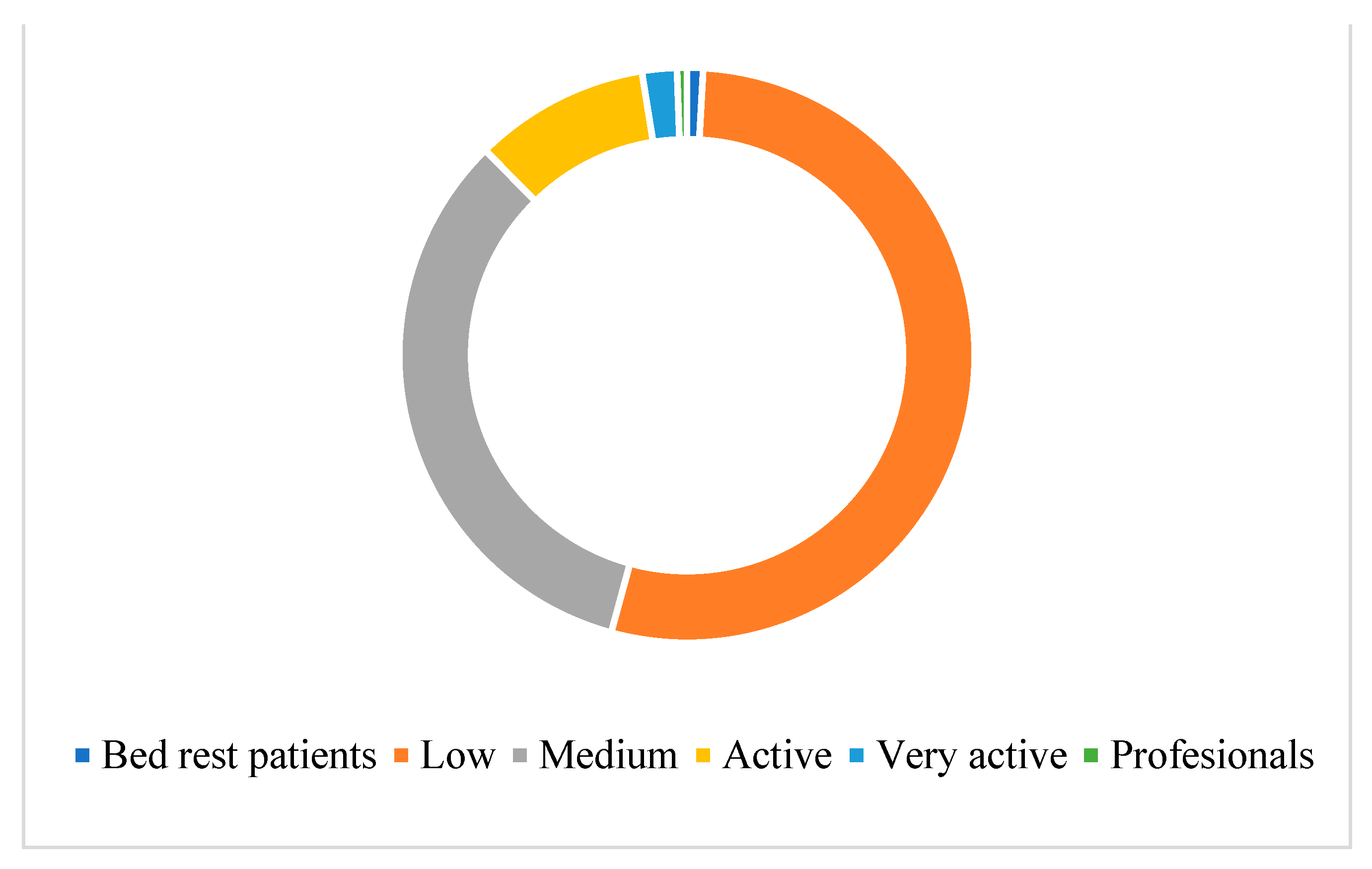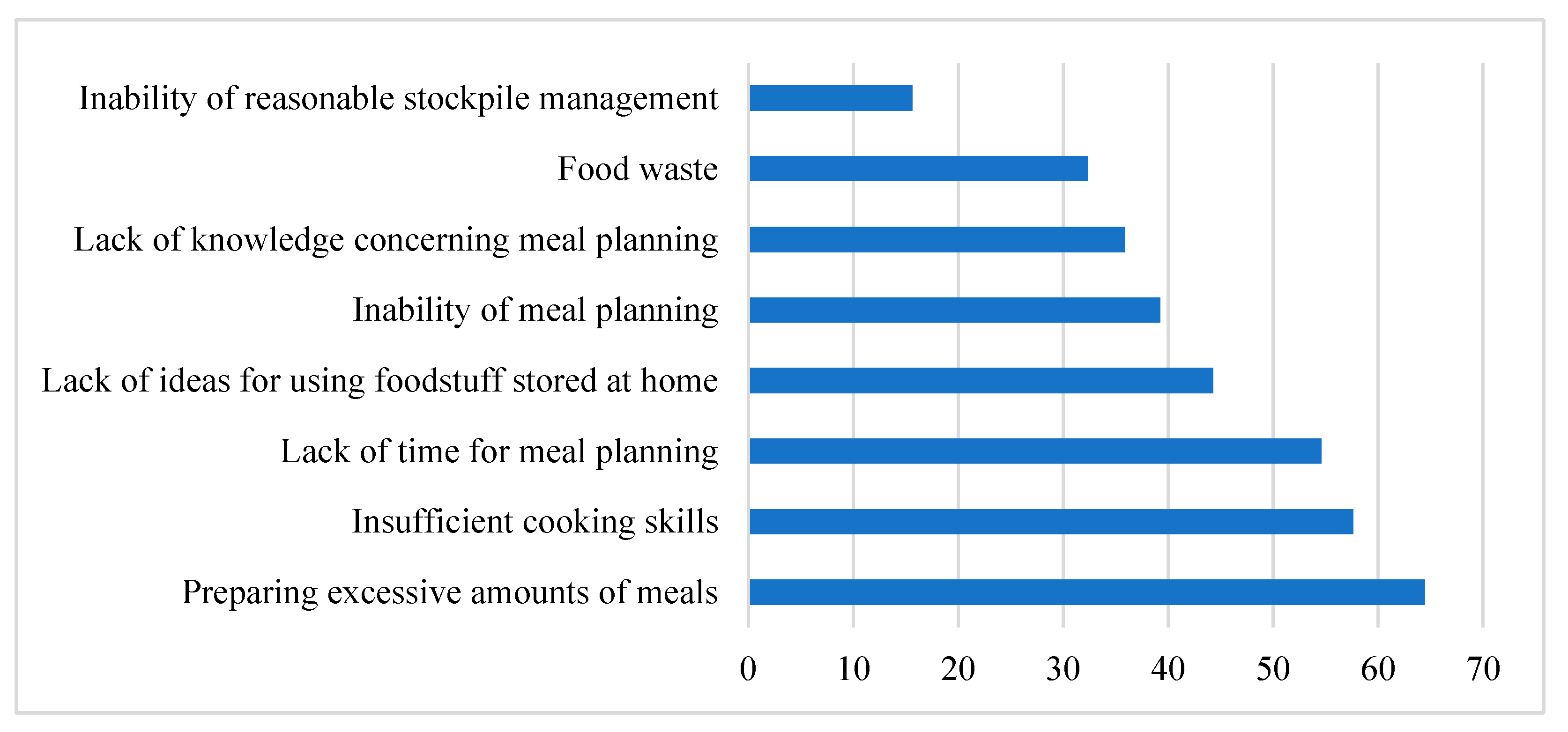Dietary Catering: The Perfect Solution for Rational Food Management in Households
Abstract
1. Introduction
2. Materials and Methods
3. Results
4. Discussion
5. Conclusions
Author Contributions
Funding
Institutional Review Board Statement
Informed Consent Statement
Data Availability Statement
Acknowledgments
Conflicts of Interest
References
- Sojkin, B.; Małecka, M.; Olejniczak, T.; Bakalarska, M. Konsument Wobec Innowacji Produktowych na Rynku Żywności; Wydawnictwo Uniwersytetu Ekonomicznego w Poznaniu: Poznań, Poland, 2009. [Google Scholar]
- Włodarczyk, R. Innowacje produktowe w przedsiębiorstwach wyrobów czekoladowych. Mark. Zarządzanie 2017, 49, 259–272. [Google Scholar] [CrossRef][Green Version]
- Pyrzyńska, E. Zachowania konsumenta na rynku usług cateringowych na przykładzie cateringu dietetycznego. Ekon. Probl. Tur. 2018, 42, 265–271. [Google Scholar]
- Takacs, B.; Borrion, A. The Use of Life Cycle-Based Approaches in the Food Service Sector to Improve Sustainability: A Systematic Review. Sustainability 2020, 12, 3504. [Google Scholar] [CrossRef]
- Wahlen, S.; Heiskanen, E.; Aalto, K. Endorsing Sustainable Food Consumption: Prospects from Public Catering. J. Consum. Policy 2012, 35, 7–21. [Google Scholar] [CrossRef]
- Kooiman, N. The catering sector as a sustainable value chains. In Sustainable Value Chains for Sustainable Food Systems; Meybeck, A., Redfern, S., Eds.; FAO: Rome, Italy, 2016; pp. 263–278. ISBN 978-92-5-109532-4. [Google Scholar]
- Trząskowska, M.; Łepecka, A.; Neffe-Skocińska, K.; Marciniak-Lukasiak, K.; Zielińska, D.; Szydłowska, A.; Bilska, B.; Tomaszewska, M.; Kołożyn-Krajewska, D. Changes in Selected Food Quality Components after Exceeding the Date of Minimum Durability—Contribution to Food Waste Reduction. Sustainability 2020, 12, 3187. [Google Scholar] [CrossRef]
- Di Stefano, V.; Durazzo, A.; Lucarini, M. Food waste: Treatments, environmental impacts, current and potential uses. Sustainability 2022, 14, 234. [Google Scholar] [CrossRef]
- Gorzeń-Mitka, I.; Bilska, B.; Tomaszewska, M.; Kołożyn-Krajewska, D. Mapping the Structure of Food Waste Management Research: A Co-Keyword Analysis. Int. J. Environ. Res. Public Health 2020, 17, 4798. [Google Scholar] [CrossRef]
- Xue, L.; Liu, X.; Lu, S.; Cheng, G.; Hu, Y.; Liu, J.; Dou, Z.; Cheng, S.; Liu, G. China’s food loss and waste embodies increasing environmental impacts. Nat. Food 2021, 2, 519–528. [Google Scholar] [CrossRef]
- Bilska, B.; Tomaszewska, M.; Kołożyn-Krajewska, D.; Piecek, M. Segmentation of Polish Households Taking into Account Food Waste. Foods 2020, 9, 379. [Google Scholar] [CrossRef]
- Secondi, L.; Principato, L.; Laureti, T. Household food waste behavior in EU-27 countries: A multilevel analysis. Food Policy 2015, 56, 25–40. [Google Scholar] [CrossRef]
- Thyberg, K.L.; Tonjes, D.J. Drivers of food waste and their implications for sustainable policy development. Resour. Conserv. Recycl. 2016, 106, 110–123. [Google Scholar] [CrossRef]
- Zielińska, D.; Bilska, B.; Marciniak-Łukasiak, K.; Łepecka, A.; Trząskowska, M.; Neffe-Skocińska, K.; Tomaszewska, M.; Szydłowska, A.; Kołożyn-Krajewska, D. Consumer Understanding of the Date of Minimum Durability of Food in Association with Quality Evaluation of Food Products After Expiration. Int. J. Environ. Res. Public Health 2020, 17, 1632. [Google Scholar] [CrossRef] [PubMed]
- Chaiyasoonthorn, W.; Khalid, B.; Chaveesuk, S. Success of Smart Cities Development with Community’s Acceptance of New Technologies: Thailand Perspective. In Proceedings of the 9th International Conference on Information Communication and Management, Prague, Czech Republic, 23–26 August 2019; pp. 106–111. [Google Scholar] [CrossRef]
- Tomaszewska, M.; Bilska, B.; Kołożyn-Krajewska, D. Do Polish Consumers Take Proper Care of Hygiene while Shopping and Preparing Meals at Home in the Context of Wasting Food? Int. J. Environ. Res. Public Health 2020, 17, 2074. [Google Scholar] [CrossRef] [PubMed]
- Grzymisławska, M.; Puch, E.A.; Zawada, A.; Grzymisławski, M. Do nutritional behaviors depend on biological sex and cultural gender? Adv. Clin. Exp. Med. Off. Organ Wroc. Med. Univ. 2020, 29, 165–172. [Google Scholar] [CrossRef]
- Khalid, B. Entrepreneurial insight of purchase intention and co-developing behavior of organic food consumption. Polish J. Manag. Stu. 2021, 24, 142–163. [Google Scholar] [CrossRef]
- Nguyen, T.H.; Vu, D.C. Food Delivery Service During Social Distancing: Proactively Preventing or Potentially Spreading Coronavirus Disease-2019? Disaster Med. Public Health Prep. 2020, 14, e9–e10. [Google Scholar] [CrossRef]
- Orfanos, P.; Naska, A.; Trichopoulos, D.; Slimani, N.; Ferrari, P.; Van Bakel, M.; Deharveng, G.; Overvad, K.; Tjonneland, A.; Halkjær, J.; et al. Eating out of home and its correlates in 10 European countries. The European Prospective Investigation into Cancer and Nutrition (EPIC) study. Public Health Nutr. 2007, 10, 1515–1525. [Google Scholar] [CrossRef]
- Adams, J.; Goffe, L.; Brown, T.; A Lake, A.; Summerbell, C.; White, M.; Wrieden, W.; Adamson, A.J. Frequency and socio-demographic correlates of eating meals out and take-away meals at home: Cross-sectional analysis of the UK national diet and nutrition survey, waves 1–4 (2008–12). Int. J. Behav. Nutr. Phys. Act. 2015, 12, 51. [Google Scholar] [CrossRef]
- Todd, J.E. Changes in consumption of food away from home and intakes of energy and other nutrients among US working-age adults, 2005–2014. Public Health Nutr. 2017, 20, 3238–3246. [Google Scholar] [CrossRef]
- Afshin, A.; Sur, P.J.; Fay, K.A.; Cornaby, L.; Ferrara, G.; Salama, J.S.; Mullany, E.C.; Abate, K.H.; Abbafati, C.; Abebe, Z.; et al. Health effects of dietary risks in 195 countries, 1990–2017: A systematic analysis for the Global Burden of Disease Study 2017. Lancet 2019, 393, 1958–1972. [Google Scholar] [CrossRef]
- Wang, D.D.; Li, Y.; Afshin, A.; Springmann, M.; Mozaffarian, D.; Stampfer, M.J.; Hu, F.B.; Murray, C.J.; Willett, W.C. Global Improvement in Dietary Quality Could Lead to Substantial Reduction in Premature Death. J. Nutr. 2019, 149, 1065–1074. [Google Scholar] [CrossRef] [PubMed]
- Forouzanfar, M.H.; Alexander, L.; Anderson, H.R.; Bachman, V.F.; Biryukov, S.; Brauer, M.; Burnett, R.; Casey, D.; Coates, M.M.; Cohen, A.; et al. Global, regional, and national comparative risk assessment of 79 behavioural, environmental and occupational, and metabolic risks or clusters of risks in 188 countries, 1990–2013: A systematic analysis for the Global Burden of Disease Study 2013. Lancet 2015, 386, 2287–2323. [Google Scholar] [CrossRef]
- Bilska, B.; Tomaszewska, M.; Kołożyn-Krajewska, D. Managing the Risk of Food Waste in Foodservice Establishments. Sustainability 2020, 12, 2050. [Google Scholar] [CrossRef]
- Tomaszewska, M.; Bilska, B.; Tul-Krzyszczuk, A.; Kołożyn-Krajewska, D. Estimation of the Scale of Food Waste in Hotel Food Services—A Case Study. Sustainability 2021, 13, 421. [Google Scholar] [CrossRef]
- Springmann, M.; Wiebe, K.; Mason-D’Croz, D.; Sulser, T.B.; Rayner, M.; Scarborough, P. Health and nutritional aspects of sustainable diet strategies and their association with environmental impacts: A global modelling analysis with country-level detail. Lancet Planet. Health 2018, 2, e451–e461. [Google Scholar] [CrossRef]
- de Queiroz, F.L.N.; Raposo, A.; Han, H.; Nader, M.; Ariza-Montes, A.; Zandonadi, R.P. Eating Competence, Food Consumption and Health Outcomes: An Overview. Int. J. Environ. Res. Public Health 2022, 19, 4484. [Google Scholar] [CrossRef]
- Nitschke, E.; Gottesman, K.; Hamlett, P.; Mattar, L.; Robinson, J.; Tovar, A.; Rozga, M. Impact of Nutrition and Physical Activity Interventions Provided by Nutrition and Exercise Practitioners for the Adult General Population: A Systematic Review and Meta-Analysis. Nutrients 2022, 14, 1729. [Google Scholar] [CrossRef] [PubMed]
- Sugiyama, T.; Hadgraft, N.; Clark, B.K.; Dunstan, D.W.; Owen, N. Sitting at work & waist circumference-A cross-sectional study of Australian workers. Prev. Med. 2020, 141, 106243. [Google Scholar] [CrossRef]
- Ráthonyi, G.; Kósa, K.; Bács, Z.; Ráthonyi-Ódor, K.; Füzesi, I.; Lengyel, P.; Bácsné Bába, É. Changes in Workers’ Physical Activity and Sedentary Behavior during the COVID-19 Pandemic. Sustainability 2021, 13, 9524. [Google Scholar] [CrossRef]
- Javad Koohsari, M.; Nakaya, T.; Shibata, A.; Ishii, K.; Oka, K. Working from Home After the COVID-19 Pandemic: Do Company Employees Sit More and Move Less? Sustainability 2021, 13, 939. [Google Scholar] [CrossRef]
- Ryde, G.C.; Brown, H.E.; Peeters, G.M.; Gilson, N.D.; Brown, W.J. Desk-based occupational sitting patterns: Weight-related health outcomes. Am. J. Prev. Med. 2013, 45, 448–452. [Google Scholar] [CrossRef] [PubMed]
- Juraszek, K.; Kalisz, Z.; Krzyżaniak, J.; Kucharczuk, M.; Molska, B. Dietary catering and its effectiveness combined with physical exercise. J. Educ. Health Sport 2019, 9, 138–152. Available online: https://apcz.umk.pl/JEHS/article/view/7266 (accessed on 8 March 2022).
- Maj, A. Dieta Z pudełka”—Motywacje osób korzystających Z Gotowego Cateringu Dietetycznego. FSOC 2016, 58, 165–175. [Google Scholar] [CrossRef]
- Pohořelá, B.; Poláchová, A.; Růžičková, M.; Doležal, M.; Pulkrabová, J.; Pánek, J. Nutritional evaluation of the full-day diet. Czech J. Food Sci. 2022, 40, 118–129. [Google Scholar] [CrossRef]
- Brennan, A.; Browne, S. Food Waste and Nutrition Quality in the Context of Public Health: A Scoping Review. Int. J. Environ. Res. Public Health 2021, 18, 5379. [Google Scholar] [CrossRef]
- Kretschmer, S.; Dehm, S. Sustainability Transitions in University Food Service—A Living Lab Approach of Locavore Meal Planning and Procurement. Sustainability 2021, 13, 7305. [Google Scholar] [CrossRef]
- Willett, W.; Rockström, J.; Loken, B.; Springmann, M.; Lang, T.; Vermeulen, S.; Garnett, T.; Tilman, D.; DeClerck, F.; Wood, A.; et al. Food in the Anthropocene: The EAT–Lancet Commission on healthy diets from sustainable food systems. Lancet 2019, 393, 447–492. [Google Scholar] [CrossRef]
- Vermeulen, S.J.; Campbell, B.M.; Ingram, J.S.I. Climate Change and Food Systems. Annu. Rev. Environ. Resour. 2012, 37, 195–222. [Google Scholar] [CrossRef]
- FAO; IFAD; UNICEF; WFP; WHO. The STATE of Food Security and Nutrition in the World 2020; FAO: Rome, Italy; IFAD: Rome, Italy; UNICEF: New York, NY, USA; WFP: Rome, Italy; WHO: Geneva, Switzerland, 2020. [Google Scholar]
- Bilska, B.; Tomaszewska, M.; Kołożyn-Krajewska, D. Analysis of the Behaviors of Polish Consumers in Relation to Food Waste. Sustainability 2020, 12, 304. [Google Scholar] [CrossRef]
- Hanssen, O.J.; Syversen, F.; Stø, E. Edible food waste from Norwegian households—Detailed food waste composition analysis among households in two different regions in Norway. Resour. Conserv. Recycl. 2016, 109, 146–154. [Google Scholar] [CrossRef]
- United Nations Environment Programme. Food Waste Index Report 2021. FAO (2015) Food Wastage Footprint and Climate Change; United Nations Environment Programme: Nairobi, Kenya, 2021. [Google Scholar]


| Parameter | Women | Men |
|---|---|---|
| Sex [number of people] | 3988 | 2543 |
| Age [years] | 36.23 1 ± 11.99 (35 2; 18 3; 18 4; 89 5; 27 6; 44 7) | 35.82 ± 11.69 (35; 18; 19; 84; 27; 43) |
| Weight [kilograms] | 74.71 ± 16.83 (71; 70; 50; 150; 63; 83) | 83.65 ± 19.91 (81; 70; 50; 150; 68; 95) |
| Height [centimeters] | 167.24 ± 7.23 (167; 164;150; 200; 163; 171) | 173.23 ± 9.86 (173; 170; 150; 208; 165; 180) |
| Average BMI | 26.65 a ± 5.39 (25; multiple; 16.33; 62.43; 23; 29) | 27.74 a ± 5.60 (27; multiple; 15.61; 58.59; 24; 31) |
| Ranges of BMI Values | Women | Men |
|---|---|---|
| Less than 16—severely underweight | 0 | 2 |
| 16–16.99—moderately underweight | 11 | 6 |
| 17–18.49—mildly underweight | 55 | 33 |
| 18.5–24.99—normal | 1674 | 821 |
| 25–29.99—overweight | 1348 | 938 |
| 30–34.99—obese class I | 618 | 479 |
| 35–39.99—obese class II | 183 | 177 |
| more than 40—obese class III | 99 | 87 |
Publisher’s Note: MDPI stays neutral with regard to jurisdictional claims in published maps and institutional affiliations. |
© 2022 by the authors. Licensee MDPI, Basel, Switzerland. This article is an open access article distributed under the terms and conditions of the Creative Commons Attribution (CC BY) license (https://creativecommons.org/licenses/by/4.0/).
Share and Cite
Zborowski, M.; Mikulec, A. Dietary Catering: The Perfect Solution for Rational Food Management in Households. Sustainability 2022, 14, 9174. https://doi.org/10.3390/su14159174
Zborowski M, Mikulec A. Dietary Catering: The Perfect Solution for Rational Food Management in Households. Sustainability. 2022; 14(15):9174. https://doi.org/10.3390/su14159174
Chicago/Turabian StyleZborowski, Marek, and Anna Mikulec. 2022. "Dietary Catering: The Perfect Solution for Rational Food Management in Households" Sustainability 14, no. 15: 9174. https://doi.org/10.3390/su14159174
APA StyleZborowski, M., & Mikulec, A. (2022). Dietary Catering: The Perfect Solution for Rational Food Management in Households. Sustainability, 14(15), 9174. https://doi.org/10.3390/su14159174







